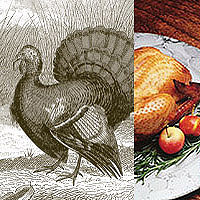Gluten Free
What does following a gluten-free diet mean? That you're embarking on an easy diet with a wide range of health-promoting effects. Instead of dwelling on what you’re giving up, consider that you’re going to enjoy a whole new world of delicious food options to meet your special dietary needs. You’ll be eating seasonally, choosing more fresh fruits and vegetables, focusing on meats, seafood, poultry, legumes, lentils, corn, and rice, and discovering fascinating ancient grains such as quinoa, amaranth, and millet. You’ll be able to eat potatoes, eggs, most cheeses, even chocolate (!)—and enjoy them without guilt because you’ll be taking good care of your body. In fact, you’ll probably end up eating—and feeling—better than ever!
Visit this page for more information about living Gluten Free
---
We carry a large variety of gluten free items, the brands listed below represent just some of the offerings we carry















More Diets
Turkey

Storing
Store fresh turkey in its original wrapping, over-wrapped with aluminum foil to catch any leakage. Remove giblets and store in separate container. Use or freeze giblets within 24 hours. Store the body of the bird in the coldest part of the refrigerator. Raw turkey meat can be refrigerated for two days. To store cooked turkey, remove meat from the bone, wrap in plastic or foil, and keep in the coldest part of the refrigerator for no more than three days. Freeze fresh turkey if you do not plan to cook it within two days of purchase. Most turkeys are too large to be quickly frozen in a home refrigerator. To eliminate the possibility of salmonella, cut up turkey, wash parts in cold water, dry with paper towel, and wrap for freezing in foil or heavy freezer wrap. Be sure to press the air out of the package before freezing. Turkey parts can be stored in the freezer for six months. Cooked turkey, gravy, and stuffing should be packaged separately and may be kept frozen in foil or freezer bags for up to one month. Thaw turkey in the refrigerator; never thaw at room temperature. In the refrigerator a whole turkey will thaw in one to five days, depending on the size. Turkey may also be thawed by immersing in cold water. Leave turkey in its original wrappings or place it in a watertight bag. Change water every 30 minutes. Turkey will thaw in roughly 4 to 12 hours, depending on the size of the bird. For quick-thawing of raw or cooked turkey, use the microwave at Defrost or Medium-Low setting, according to the manufacturer’s directions. Turn turkey as it thaws; take care the turkey does not begin to cook. Cook the turkey immediately after it is thawed. If it is not served immediately, either keep cooked turkey hot, between 140 and 160°F (60 and 71°C), or refrigerate it at 40°F (4.4°C) or lower. Do not travel long distances with hot turkey. When transporting cooked turkey to another dining site, place it in an insulated container or ice chest until ready to eat.
Copyright © 2025 TraceGains, Inc. All rights reserved.
Learn more about TraceGains, the company.
The information presented in the Food Guide is for informational purposes only and was created by a team of US–registered dietitians and food experts. Consult your doctor, practitioner, and/or pharmacist for any health problem and before using any supplements, making dietary changes, or before making any changes in prescribed medications. Information expires December 2025.











